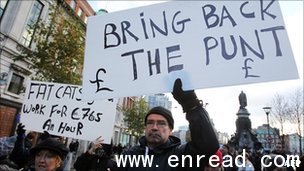爱尔兰即将进行预算投票
The Republic of Ireland is set to unveil more details of its controversial budget cuts.
爱尔兰共和国将要公布有争议的预算缩减计划的更多细节。

Ireland's deal to secure bail-out aid brought thousands of protesters onto the streets of Dublin
Finance Minister Brian Lenihan is planning an initial 6bn euros (£5bn) of cuts in welfare spending and job losses.
It is part of a deal to secure an 85bn-euro bail-out, but Fianna Fail's slim majority means the vote could be close.
Once the budget is cleared by parliament it will trigger the first tranche(部分) of bail-out funds from the European Union and International Monetary Fund.
The government previously announced cuts under a four-year National Recovery Plan unveiled two weeks ago.
Dublin is looking to save about 15bn euros over the period as it struggles to balance the books after its banking and property.
But on Tuesday prime minister Brian Cowen's government is to announce its spending programme for this financial year, having already warned that 2010/11 was likely to see the biggest cuts of the four-year plan.
The Irish Republic's generous welfare budget is a prime target for the axe.
Child benefit is being slashed(削减) , and social welfare spending - state pensions excluded(排除) - is being cut by 5%.
Thousands of public sector jobs will go. Civil service pay freezes will be imposed, and reform of the tax system will bring thousands of Irish people into the tax net. The minimum wage will be lowered.
Mr Cowen says the cuts are necessary because Ireland was living way beyond its means.
Surging bond yields - the interest rates Dublin pays to borrow money - forced the government to ask for a bail-out on 28 November, as the Republic could no longer afford to raise money in the financial markets.
Mr Cowen, with his poll rating at a record low, needs to push the budget through to avoid having to call a snap election.
Failure to do so could plunge(使陷入) the Republic into a deeper crisis, one that could help spread contagion(传染病,蔓延) throughout the heavily-indebted eurozone.